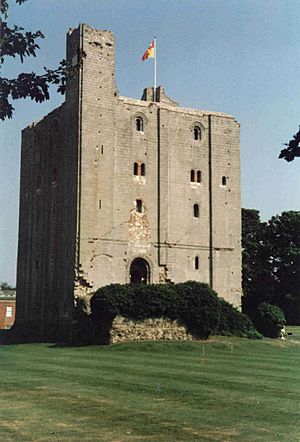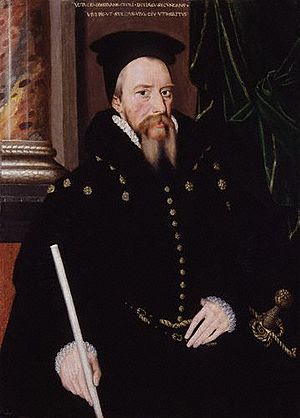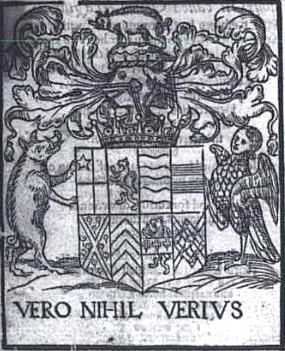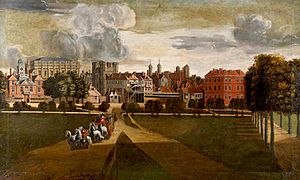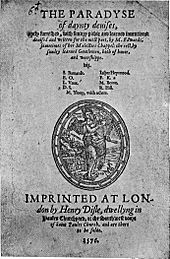Edward de Vere, 17th Earl of Oxford facts for kids
Quick facts for kids
The Earl of Oxford
|
|
|---|---|
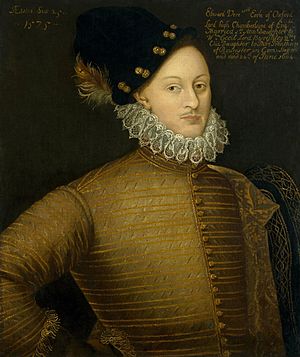
17th-century portrait based on lost 1575 original, National Portrait Gallery, London
|
|
| Born | 12 April 1550 Hedingham Castle, Essex, England |
| Died | 24 June 1604 (aged 54) Kings Place, Hackney |
| Tenure | 1562–1604 |
| Other titles | Viscount Bulbeck |
| Nationality | English |
| Locality | Essex |
| Offices | Lord Great Chamberlain |
| Spouse(s) | |
| Issue |
|
| Parents | John de Vere, 16th Earl of Oxford Margery Golding |
| Signature | |
Edward de Vere, the 17th Earl of Oxford (born 12 April 1550, died 24 June 1604), was an English nobleman and a member of the royal court during the time of Elizabeth I. He was known for his love of the arts. He was also a poet and a writer of plays.
As the heir to one of England's oldest earldoms, he was a favorite at Queen Elizabeth's court for a while. He supported many artists and writers. People at the time admired him as a poet and playwright. However, his strong personality sometimes caused problems. This made it hard for him to get important jobs in the government. It also led to him losing much of his family's wealth.
Edward de Vere was the only son of John de Vere, 16th Earl of Oxford, and Margery Golding. When his father died in 1562, Edward became a ward of Queen Elizabeth I. This meant the Queen became his guardian. He then lived with her main advisor, Sir William Cecil. Edward married Cecil's daughter, Anne. They had five children together. For five years, he lived apart from Anne. He also refused to believe he was the father of their first child.
Oxford was a skilled jouster, which is like a knightly sport. He traveled a lot in France and Italy. He was one of the first people at Elizabeth's court to write love poems. He was also praised as a playwright. Sadly, none of his plays that are known to be his still exist today. Many books were dedicated to Oxford. These books praised him for supporting writers, musicians, and even performing animals.
In the early 1580s, he lost favor with the Queen. He was sent away from court and briefly put in the Tower of London. This happened after his mistress, Anne Vavasour, had his son. Anne Vavasour was one of the Queen's maids of honor. She was also put in prison. This event caused fights in the streets between Oxford and Anne's relatives. He made up with the Queen in May 1583. But he had lost all chances for important jobs. In 1586, the Queen gave Oxford £1,000 every year. This money helped him with his financial problems. These problems were caused by his spending too much and selling his lands.
After his first wife, Anne Cecil, died, Oxford married Elizabeth Trentham. She was also one of the Queen's maids of honor. They had a son, Henry de Vere, who became his heir. Oxford died in 1604. By then, he had spent all the money and lands he had inherited.
Since the 1920s, some people have suggested that Oxford might have written the plays and poems usually credited to William Shakespeare. This idea is part of the Oxfordian theory of Shakespeare authorship.
Contents
Early Life and Family
Edward de Vere was born at Hedingham Castle in Essex, England. This castle was the home of his family, the de Veres. They held the second-oldest earldom in England. Edward was the only son of John de Vere, 16th Earl of Oxford, and his second wife, Margery Golding. He was likely named after King Edward VI.
He had an older half-sister named Katherine. She was from his father's first marriage. He also had a younger sister, Mary de Vere. Both of his parents had connections to the royal court. His father helped Princess Elizabeth when she became Queen. His mother became a maid of honor in 1559.
Before his father died, Edward de Vere was called Viscount Bulbeck. He was raised in the Protestant faith. Like many noble children, he was raised by other people. He lived in the home of Sir Thomas Smith. At eight years old, he went to Queens' College at Cambridge. Later, he moved to St John's. His tutor, Thomas Fowle, was paid £10 each year.
His father died on August 3, 1562. Because his father held lands from the Crown, Edward became a royal ward of the Queen. He was placed in the home of Sir William Cecil. Cecil was the Queen's chief advisor. At 12, Edward became the 17th Earl of Oxford. He also became the Lord Great Chamberlain of England. He inherited a large estate. Its yearly income was about £2,500, but it might have been as high as £3,500.
Life as a Royal Ward
While living at Cecil House, Oxford had a busy daily schedule. He had dancing lessons, and studied French, Latin, and geography. He also practiced writing and drawing. For a short time, he was tutored by Laurence Nowell, a scholar. Nowell left after eight months. This might mean Oxford was a difficult student, or that he learned very quickly.
In 1564, Oxford was one of 17 noblemen to receive an honorary Master of Arts degree from Cambridge University. He received another from the University of Oxford in 1566. In 1567, he began studying law at Gray's Inn.
In July 1567, Oxford was practicing fencing at Cecil House. An accident happened, and a cook in the household died.
Records from 1569 show Oxford continued to be interested in history, literature, and philosophy. He bought books by Chaucer, Plutarch, Cicero, and Plato. He also bought a Geneva Bible. In 1570, Oxford met the mathematician and astrologer John Dee. He became interested in subjects like occultism and conjuring.
In 1569, Oxford was considered for the Order of the Garter. This was a very high honor, but he never received it. In November of that year, he asked to join the military abroad. Queen Elizabeth did not allow it. He eventually served in a campaign in Scotland the next spring. He became a strong supporter of the Earl of Sussex at court.
Becoming an Adult Nobleman
On April 12, 1571, Oxford turned 21. This meant he was officially an adult. He took his place in the House of Lords. People had high hopes for him. They thought he would gain new titles, not lose his old ones.
Oxford was a favorite of Queen Elizabeth's by 1571. In May, he took part in a three-day jousting event. He didn't win, but he was given special honors. People admired his skill. In August, Oxford met Paul de Foix, who was in England to arrange a marriage. This marriage was between Queen Elizabeth and Prince François de France. This marriage was planned to weaken Spain's power.
Oxford's poems were published around this time. He was one of the first courtiers to write English poetry for the court.
Marriage and Travels
In the summer of 1571, Oxford became interested in Anne Cecil, who was 14. She was the daughter of Lord Burghley. The Queen agreed to their marriage. Anne had been promised to Philip Sidney two years earlier. But those plans were canceled. Oxford and Anne were married on December 16, 1571, at the Palace of Whitehall. The Queen attended this special triple wedding. Burghley gave Oxford land worth £800 and £3,000 in cash as Anne's dowry.
In 1572, Oxford's cousin, the Duke of Norfolk, was found guilty of a plot against the Queen. He was executed. Oxford had tried to help his cousin, but it didn't work.
In the summer of 1574, Queen Elizabeth told Oxford off for spending too much. On July 1, he left for Europe without permission. He traveled to Calais and then to Flanders. He took a lot of money with him. The Queen sent people to bring him back. Oxford returned to England by the end of the month. He was not allowed to join the Privy Council. However, the Queen's anger lessened. She promised him permission to travel to Paris, Germany, and Italy if he behaved well.
Travels in Europe
In January 1575, Queen Elizabeth gave Oxford permission to travel. She also gave him letters of introduction to foreign kings and queens. He left England in early February 1575. A month later, he met the King and Queen of France. He heard that his wife, Anne, was expecting a baby. He sent her many expensive gifts. But somehow, he became suspicious of Anne and her family. He started to believe the child was not his. Anne's parents were very upset by these rumors.
In mid-March, Oxford traveled to Strasbourg, then to Venice, Italy. His daughter, Elizabeth, was born in July. But Oxford did not learn of her birth until late September.
Oxford stayed in Italy for a year. He was very interested in Italian fashion, jewelry, and makeup. He brought many Italian luxury items back to England. These items quickly became popular at court. For example, he introduced embroidered and scented gloves. Queen Elizabeth had a pair of these gloves that were famous for their perfume. Oxford's only recorded comment about Italy was not very excited. He wrote that he was glad to have seen it, but didn't care to see it again unless it was for his country.
By January 1576, Oxford was getting complaints about his debts. He wrote to Lord Burghley, asking that more of his land be sold to pay them. He left Venice in March. By this time, an Italian banker had lent Oxford over £4,000 for his travels. In England, over a hundred tradesmen were trying to collect thousands of pounds in debts from him.
When Oxford returned to England in April 1576, his ship was attacked by pirates. They took his belongings and left him with only his shirt. He might have been killed if one of them hadn't recognized him.
After returning, Oxford refused to live with his wife. He rented rooms in London. He had many complaints about the Cecil family. The Queen asked him to allow Anne to attend court. He agreed, but only when he was not there. He also insisted she not try to speak to him. He lived apart from Anne for five years.
Supporting the Arts
The previous Earl of Oxford had a group of actors called Oxford's Men. The 17th Earl stopped this group two years after his father died. But starting in 1580, Oxford began supporting new acting groups. He also supported musicians, acrobats, and performing animals. The new Oxford's Men toured England from 1580 to 1587.
Around 1583, Oxford bought a lease for a theater in Blackfriars. He gave it to his secretary, the writer John Lyly. Lyly put Henry Evans in charge of a new group called Oxford's Boys. This group was made up of child actors. Lyly then focused on writing plays for them. Oxford's Men continued to be active until 1602.
Financial Troubles and Later Life
On April 6, 1584, Oxford's daughter Bridget was born. Two books were dedicated to him that year. One of them mentioned Oxford's knowledge of astronomy, history, languages, and music.
Oxford's money problems were getting worse. He had sold almost all the lands he inherited. This cut off his main source of income. In 1586, Oxford asked the Queen for money to help him. His father-in-law also lent him large amounts of money. Queen Elizabeth gave him £1,000 each year. This payment continued even after her death, under King James I.
Another daughter, Susan, was born in May 1587. Another daughter, Frances, died young in September.
In July 1588, England was threatened by the Spanish Armada. Oxford wanted to fight. He was offered a job as governor of the port of Harwich, but he turned it down.
In 1591, Oxford sold his London home, Fisher's Folly. He also sold the Great Garden property in Aldgate. This was for the benefit of Elizabeth Trentham, one of the Queen's Maids of Honour. Oxford married Elizabeth later that year. On February 24, 1593, she gave birth to his only surviving son, Henry de Vere. Henry became his heir.
Between 1591 and 1592, Oxford sold the last of his large estates. Hedingham Castle, his family's main home, went to Lord Burghley. It was held in trust for Oxford's three daughters from his first marriage.
In January 1595, his daughter Elizabeth married William Stanley, 6th Earl of Derby. Derby promised Elizabeth £1,000 a year, but the money was slow to arrive.
His father-in-law, Lord Burghley, died in August 1598. He left money to Oxford's two unmarried daughters, Bridget and Susan. The money was set up so Oxford could not control it.
In 1599, Oxford's 15-year-old daughter Bridget married Francis Norris. His daughter Susan married Philip Herbert.
Oxford continued to have financial difficulties. He tried to get permission to operate the tin mines in Cornwall. He also tried to get other official positions, like Governor of Jersey or President of Wales. But he was not successful.
In 1601, after a rebellion, Oxford was one of the noblemen who judged the trials of the rebels. He also became involved in a complex legal case about lands that had been taken by the Crown. This case also ended in disappointment for him.
Final Years
On March 24, 1603, Queen Elizabeth died. Oxford had been ill for a long time. He was sad about the Queen's death. He also worried about the future. However, his fears were not true. King James I granted his request to have Waltham Forest and the house and park of Havering returned to him. On July 25, Oxford helped at the King's coronation. A month later, King James confirmed his yearly payment of £1,000.
Edward de Vere died on June 24, 1604, at his home in Hackney. He was buried on July 6 in the Hackney churchyard. His death was not widely noticed. His grave was not marked when his widow, Elizabeth Trentham, wrote her will in 1612. She asked to be buried near him and for a tomb to be built for them. But his son never built the tomb, and the exact location of their graves is now unknown.
Literary Works and Reputation
Oxford's poems were shared widely among the court. Three of his poems, "When wert thou born desire," "My mind to me a kingdom is," and "Sitting alone upon my thought," are found in many old collections of poems. His first published poem was "The labouring man that tills the fertile soil" in a book from 1573. In 1576, eight of his poems were published in a collection called The Paradise of Dainty Devises. These poems were meant to be sung. Oxford's poems were some of the only true love songs in the collection.
Writers at the time praised Oxford as a poet and playwright. William Webbe called him "the most excellent" of the Queen's court poets. Another writer, George Puttenham, put Oxford first on a list of courtier poets. He also said Oxford and Richard Edwardes deserved "highest praise" for their comedies and plays. Francis Meres listed Oxford first among 17 playwrights who were "the best for comedy."
Steven W. May, a scholar, says that Oxford was the first important courtier poet for Queen Elizabeth. His example made it more respected for other poets like Sidney and Raleigh to write. May describes Oxford as a "competent, fairly experimental poet." He says Oxford's early love poems were new and different. They were lighter and more imaginative than other court poetry of the time.
|
Loss of Good Name Framed in the front of forlorn hope, past all recovery, Earl of Oxford, before 1576 |
However, not all critics agreed. C. S. Lewis said Oxford's poetry showed "a faint talent" but was mostly "undistinguished." Another scholar, Nelson, said that people at the time probably praised Oxford's talent more because of his high social rank. He said Oxford's known poems were "astonishingly uneven" in quality.
Oxford was very popular for supporting writers and theater. Between 1564 and 1599, 28 books were dedicated to him. These included works by famous writers like John Lyly and Robert Greene. He supported writers, musicians, and actors throughout his life. This shows he had a strong interest in learning and the arts.
The Oxfordian Theory of Shakespeare Authorship
The Oxfordian theory suggests that the Earl of Oxford wrote the plays and poems that are usually believed to be by William Shakespeare of Stratford-upon-Avon. Most experts on Shakespeare do not agree with this idea. However, it has been one of the most popular alternative theories since the 1920s.
This theory was the main idea in the 2011 movie Anonymous. The movie was directed by Roland Emmerich. It starred Rhys Ifans and Jamie Campbell Bower as Oxford, and Vanessa Redgrave and Joely Richardson as Queen Elizabeth I. The film has been criticized for not being completely accurate historically. Some parts of the story, like dates, locations, and relationships, were changed for dramatic effect.
 | Laphonza Butler |
 | Daisy Bates |
 | Elizabeth Piper Ensley |


